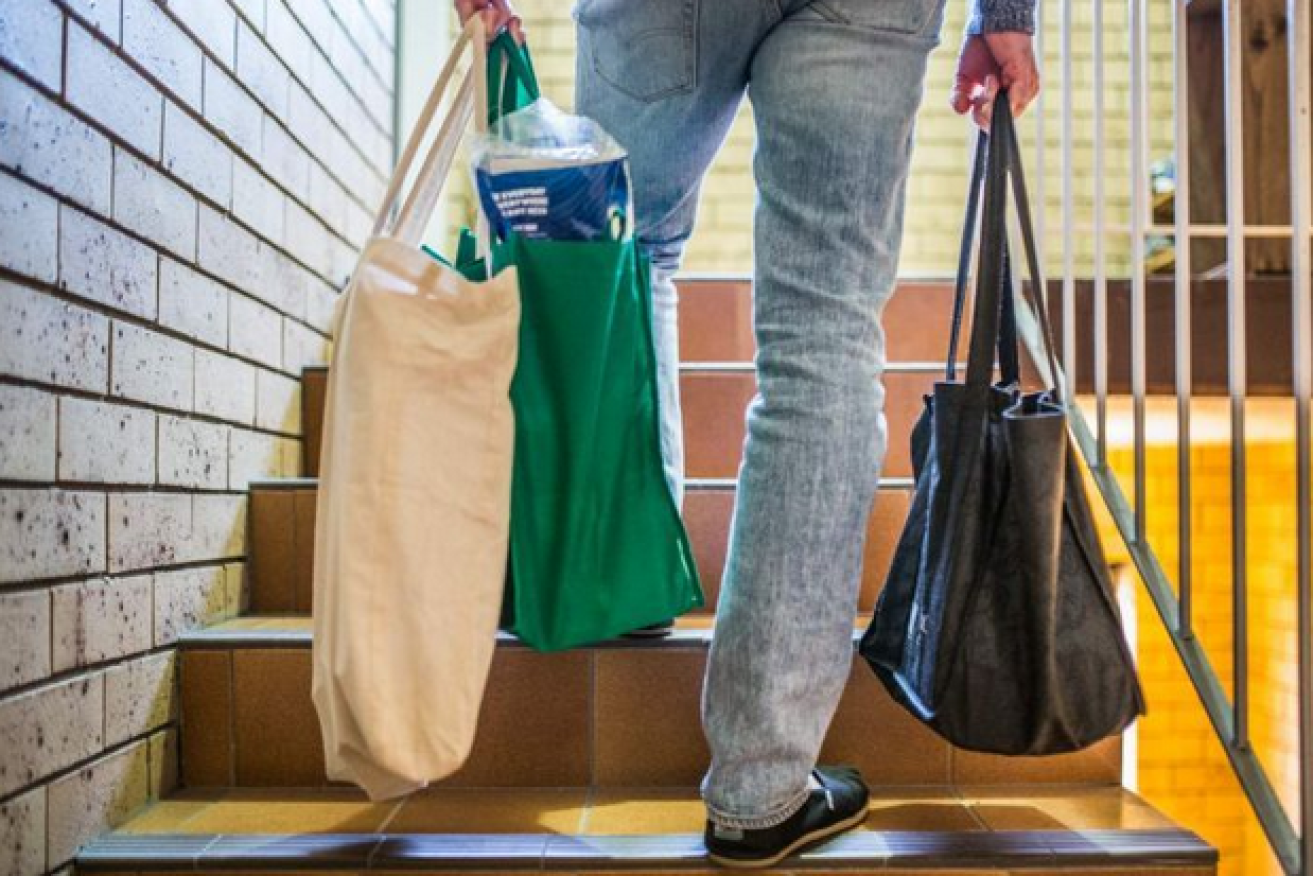Plastic bag ban: Great for the planet, a hazard for your back and shoulders

Physicians are warning against overloading the new green bags. Photo: ABC/Jessica Hinchliffe
Shoppers have been warned not to overload their bags at the checkout after reports of an increase in injuries from people trying to carry heavy reusable bags.
Stephen Bourke from Hinchinbrook Physiotherapy has seen multiple patients over the past two weeks who blame rotator cuff injuries on the weight of their shopping bags.
Single-use plastic bags were phased out earlier this month in Queensland, with their bigger and stronger replacements prompting shoppers to pack more in.
“This week I’ve seen a 65-year-old lady who had a rotator cuff tear and a 39-year-old lady who already had a rotator cuff injury and ended up damaging her neck as a result of the bags,” Mr Bourke told ABC Radio Brisbane.
“One patient told me that they’ve now been insisting that the shop assistants not overload the bag to try and keep the weight down.”
Mr Bourke said many people were avoiding buying additional bags to distribute the weight.
“A single overloaded bag could weigh eight kilograms and that weight can be quite heavy, especially for people over the age of 65.
“The old plastic bags were smaller and now they’ve doubled the size of the bags and made them stronger, so they can be easily overloaded.”
Shoulder injuries the most common
Mr Bourke said in most cases people were experiencing rotator cuff injuries.
The rotator cuff is a group of muscles and tendons that surround the shoulder joint keeping the head of the upper arm bone in place.

Minor rotator cuff injuries heal with time and physiotherapy, but major damage might requires surgery. Photo: Injurymap
The injury can cause a dull ache in the shoulder which can become worse when you try to sleep on your side.
“Lifting heavy bags into a car is where the injuries usually occur,” he said.
“If it’s a small rotator cuff tear it can be managed with physiotherapy, but if it’s a large tear people may need surgery.
“The problem though is that once you’re older than 65, many surgeons are reluctant to repair rotator cuff tendons so they’re stuck with the injury for the rest of their life.
“It can be quite debilitating for the person and the injury can have lifelong consequences.”
How the injury is treated
Mr Bourke said treatment involved strengthening the rotator cuff area gradually.
“You strengthen other muscles to take over the load, often with bands to strengthen the area,” he said.
“We often tape the area when injured to de-load the rotator cuff area to allow it to heal.
“Physiotherapists make sure the spine is moving well, keeping the thoracic spine free and mobile and gradually going through a strengthening program progressing through from bands to light weights as well.”
Followers of the ABC Radio Brisbane Facebook page had mixed opinions.
“The new bags do hold way more than the old plastic ones. I had three, two-litre milk bottles, yoghurt, chicken, cheese, and a couple of other things all shoved into one bag last week … it was heavy. Now I just put everything in the trolley loose then pack the groceries into the bags in the car.” — Sandra
“They clearly need more exercise or just buy more reusable bags and don’t overfill them.” — Freda
“The supermarket I go to always overloads the bags … I tell them off all the time and unpack half the stuff.” — Janelle
“If you hurt yourself carrying too much in your bags, you deserve it.” — Patrick
“Where’s the old cages full of boxes gone?” — Terri
“It’s not whether the bags are reusable or not, it’s about balance and not trying to bring all the bags inside in one go. One bag in each hand carried close to the body back and forth to the car and kitchen — plus you get your daily steps up.” — Ebony
Mr Bourke suggested buying more bags to distribute the weight evenly and to prevent carrying too much at once.
“The short-term pain of buying an extra bag is going to be a long-term gain for you and you’ll avoid a six-week injury.
“That has be to be worth a lot less than a $3 bag — don’t be afraid to use more bags or ask the attendant not to overfill.”







